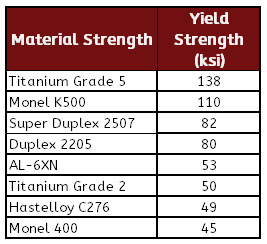 Salt water is great for swimming, but provides industry a wide range of corrosion challenges from marine vessels to desalination plants, and even off-shore oil. The good news is there are several materials that perform very well in these environments. This newsletter compares them on their salt water corrosion resistance and high strength capabilities.
Salt water is great for swimming, but provides industry a wide range of corrosion challenges from marine vessels to desalination plants, and even off-shore oil. The good news is there are several materials that perform very well in these environments. This newsletter compares them on their salt water corrosion resistance and high strength capabilities.
Corrosion Resistance
Titanium fasteners are the top choice for use in chlorides and salt water conditions. Due to its ability to rapidly regenerate its passive layer in the presence of oxygen, titanium is virtually immune to even stagnant salt water. Monel come in 2nd with extraordinary corrosion resistance to rapidly moving salt waters, which makes it the go-to solution for marine vessels. Monel bolts only lack compared to titanium in that they can experience pitting and cracking in stagnant water. AL6XN is also an excellent choice for salt water environments when they are contaminated with other corrosives. AL6XN bolts are a good mid-range corrosion resistant alloy that can handle the moderately acidic applications that titanium cannot.

Strength Capabilities
When it comes to strength, yet again Titanium bolts are key – but only Titanium grade 5, which is alloyed for added strength (138 KSI). Age hardened Monel K500 bolts are are also a top choice. Monel K500 (110 KSI) delivers much higher strength compared to its sister alloy Monel 400. Another option are Super Duplex 2507 bolts (125 KSI UTS). Super Duplex is an alloy steel that not only provides good strength but also resistance to chloride pitting, crevice and stress corrosion cracking. Super Duplex bolts are an ideal option when mid-range strength and chloride corrosion are needed – all at an economic price point.
Don’t Forget Hastelloy
Though Hastelloy is usually used in extreme corrosive environments it also serves a role in salt water resistance. Hastelloy bolts are key when other harsh contaminants such as sulfuric or hydrochloric acid is present along with salt water. It is also ideal in high temperature applications.

This is one of the most amazing content on the web.